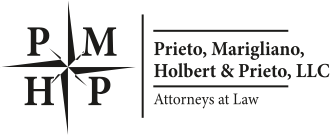Warning Signs Your Loved One Is Being Abused
Georgia Nursing Home Abuse and Neglect Attorneys: Prieto, Marigliano, Holbert, & Prieto, LLC.
Substandard care is a tragic way of life for many of the elderly, disabled and vulnerable residents of nursing homes and assisted-living facilities throughout our country. If you witness these or other warning signs of abuse and nursing home neglect, there are many steps you can take, including contacting an attorney at Prieto, Marigliano, Holbert, & Prieto, LLC.
Some Of The Most Common Signs That Should Alert Your Attention
Bed sores (also known as “pressure sores” and “decubitus ulcers”): If you visit a loved one in a nursing home and notice open sores, wounds, redness (including red or scaly patches on their skin), inflammation, skin changes, the presence of bodily fluids, unpleasant odors, or if your loved one is in pain, they may have developed bed sores on their body. Nursing home staff may tell you that it is perfectly normal or “no big deal” for patients confined to their bed to have bed sores – this is simply not true. Bed sores are a warning sign of possible neglect. They are caused by a lack of circulation to a particular area of the body – the majority of them could be prevented by simply turning or moving the patient periodically. Keep in mind that bed sores appear on pressure points that may not be directly visible. If you have any suspicion or concern, examine your loved one’s body at pressure areas such as the shoulder blades, lower back, buttocks, calves and heels.
Lack of attention to residents’ personal hygiene, skin rash or lesions, unusual odors or odors of urine or feces: Nursing homes are required by law to provide all the assistance that your loved one needs to help them with their daily activities of life, including assistance with their personal hygiene and all necessary assistance for those residents who are dealing with bladder or bowel incontinence. Failure to maintain personal hygiene (like tooth brushing, hair combing and providing sponge baths) and properly cleaning bodily fluids from incontinent residents could ultimately result in infections that lead to serious illness or even death. This nursing home neglect is unacceptable and should not be allowed to occur.
Falls, bone fractures, skin tears, contusions and bruises: If your loved one is at risk for falling due to the condition of their health, the staff is required to provide protection such as bed rails, chair restraints and proper monitoring assistance by the staff and supply medical devices like walkers or canes to help avoid falls.
Sudden weight loss: Many, if not most nursing home residents have special needs related to nutrition, including those who require feeding tubes for their daily nutritional requirements. Sudden weight loss can be a sign that the staff is not taking the appropriate steps to ensure proper nutrition.
Unexplained dehydration: A dry mouth and swollen tongue, exhibiting weakness, dizziness, confusion or sluggishness, having palpitations (feeling that the heart is jumping or pounding), or the inability to sweat are signs that your loved one may be suffering from dehydration. Dehydration can lead to very serious illness, can complicate existing medical conditions and should be addressed as soon as possible.
Frequent falls: It may be normal for a sick or elderly patient to fall occasionally due to the fragility of their bones and problems with their balance, but frequent falls are simply not acceptable. Nursing homes can minimize slip-and-fall accidents by carefully monitoring patients (particularly those who are known to be at risk for falls).
Urinary tract infections: A urinary tract infection is often the result of negligent care. These can be caused by failure to adequately shower and clean a patient after urination or failure to sanitize urinary catheters.
Improper feeding tube, output tube and catheter care: Many nursing home residents require feeding tubes or other intravenous supplements to meet their daily nutritional and hydration needs. Likewise, many residents have output tubes, colostomy bags or catheters necessary for evacuation. These devices need diligent and near-constant monitoring, cleaning and flushing by staff members (properly trained in handling the devices themselves and the insertion sites for them), ensuring that cleanliness is a priority. Improper handling, placement, removal or cleaning of these devices could lead to a host of problems, including malnutrition, dehydration, infection and even death.
Additional Problems
Nursing home staff is required to properly monitor all patients for signs and symptoms of illness, provide for all the resident’s daily necessities, allow for whatever activity is possible and provide for the resident’s medical and nursing needs as ordered by their physician. Below are listed a number of additional problems that may indicate that your loved one is not receiving the level of care that they need:
- Disorientation
- Unexplained mood changes
- Depression, isolation
- Fear or anxiety
- Unexplained refusal or inability to communicate
- Unjustified chemical or physical restraints
Complaints by your loved one: Take complaints by your loved one seriously. Nursing homes are often able to get away with neglect and/or abuse because people see caregivers or medical professionals as above reproach. Abuse can and does happen – be alert to make sure that your loved one stays alive and well.
Contact Us
To contact an attorney at PMHP Law, call us at +1-404-618-0882 or contact us by email.
